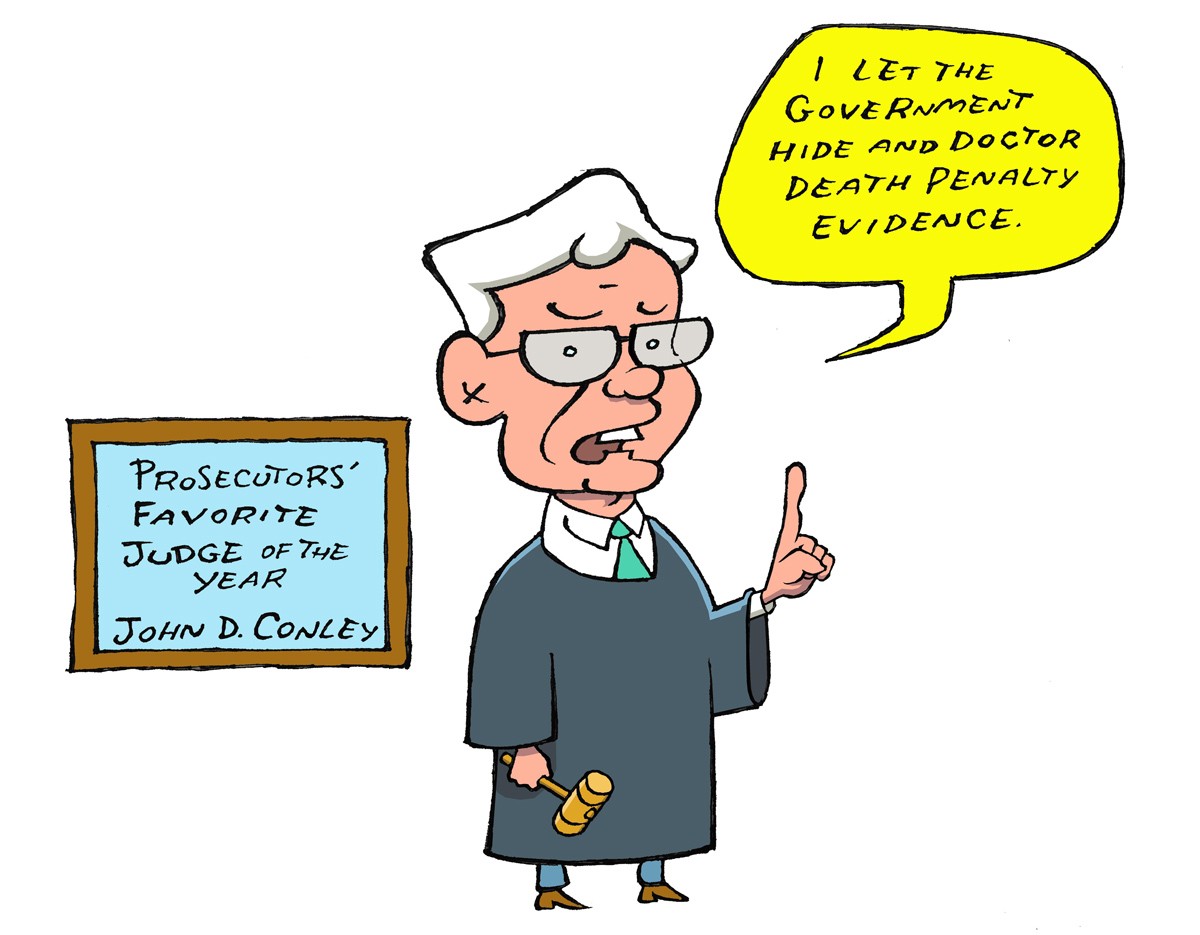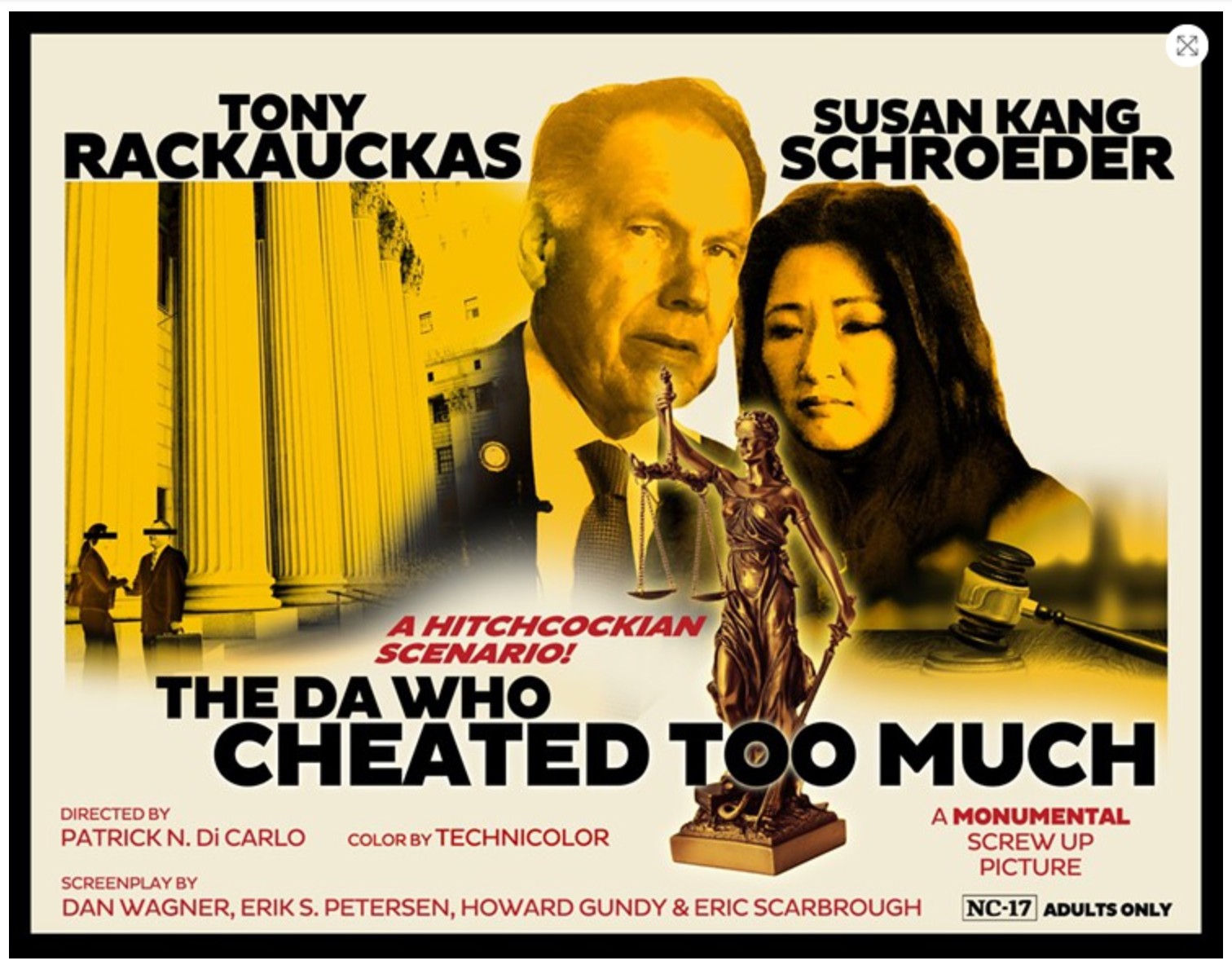
There’s good reason courtrooms are the ideal spot to solve criminal-justice mysteries. Witnesses are forced to testify under oath. Necessarily difficult questions get asked on the public record. Dubious responses face challenges, and once-buried documents finally see the light of day.
Nobody should appreciate the resolution capabilities of the California Superior Court more than judges like John D. Conley. A veteran of 44 years, Conley’s experience includes stints as a deputy district attorney for homicides, sexual assaults, writs and appeals, and gangs. He assured voters in his first campaign for the bench in 2000 that his courtroom would be “efficient” and “fair to both sides.”
Sixteen years later, however, Conley has fulfilled only half of those promises. He’s as tidy as a bunk-inspection sergeant in the army, making no secret of his determination to convert his courtroom into a defendant depository for bullet-train-quick trips to prison. His 1990 designation by a legal magazine as one of the state’s “most effective” prosecutors remains operative today. Over the years, he has shrugged his shoulders in disinterest at law-enforcement corruption.
That affliction seemed to diminish on May 3 in People v. Daniel Wozniak, a double-murder case that has won national attention for its gory details and ties to the ongoing Orange County jailhouse-snitch scandal. That’s when Conley shocked court observers by questioning Orange County Sheriff’s Department (OCSD) conduct in the pending death-penalty prosecution. He’d set a May 20 sentencing hearing, and deputies had waited until April 29 to surrender records in response to a March subpoena by Scott Sanders, Wozniak’s defense attorney. Sanders believes prosecution teams mock justice by routinely hiding evidence that contradicts government claims or aids defendants.
In consultation with deputy county counsel Liz Pejeau, OCSD custodian of records Kirsten Monteleone gave Conley a stack of records that were heavily redacted and, with understandable confidence, expected him to rubberstamp the secrecy without question. A stickler for courthouse hierarchy, the judge, however, was offended by the affront to his power. Outside of Sanders’ presence, he ordered Monteleone to supply him with unredacted copies.
Conley then compared the two sets of records, which should have been identical. But the versions didn’t match. Also, entries for key periods in Sanders’ investigation were missing from the supposedly unredacted version.

The judge faced a dilemma. He’d taken over the trial when the first judge, James Stotler—a former lawyer for the local deputies’ union—admitted in January 2015 that he despises Sanders for exposing the scandal. So far, the controversy that led to demands for a U.S. Department of Justice probe has rocked 15 murder, attempted murder and felony assault cases, a validation Conley stubbornly refuses to recognize. Without confessing his anti-Sanders prejudice, the ex-DA contemptuously labeled the public defender’s findings nonsense.
Suddenly, a suspiciously tardy records-production situation, one Conley could easily ignore, transformed itself into a bona-fide legal mystery: Why did it take so long for OCSD to surrender these records? Who tampered with them and why? And what information had they originally contained?
In a May 2 minute order, Conley—worried eventual appellate justices might be horrified by his rush to give Wozniak a one-way ticket to San Quentin State Prison’s death chamber with lingering issues—advised the department he would compel testimony to explain “why there was a recent finding of records.”
The next day produced the latest bombshell in the scandal: Newly surrendered documents came from an OCSD records system known internally as “the Blog;” those files contain five years of evidence that, in flagrant violation of previous court orders, had never been disclosed. It was déjà vu all over again.
About 18 months ago, Sanders discovered the existence of another secret OCSD records system, TRED (see “The TRED Deception: Tainted Government Informant Program Blows Another Murder Case,” April 1, 2015). The reason deputies undertook a herculean effort to keep that information hidden was obvious. Those records prove law-enforcement officials regularly violated a 1964 U.S. Supreme Court decision commonly called Massiah, which bans the government or its agents, such as informants, from questioning pretrial defendants who have been charged and have a lawyer.
One of the entries in the long-suppressed Blog undermines testimony William Grover, an OCSD Special Handling deputy, gave in People v. Scott Dekraai, involving the 2011 mass killings in Seal Beach. Grover had downplayed his contact with Fernando Perez, a violent Mexican Mafia boss turned prolific snitch. But the Blog described Grover’s alliance with Perez, who was advised to “marinate information” in the jail for the Costa Mesa Police Department, which was investigating Wozniak. Aware of Massiah prohibitions, both District Attorney Tony Rackauckas and Sheriff Sandra Hutchens describe Perez’s placement next to Wozniak in a jail with more than 6,000 inmates as accidental.
Conley allowed Sanders to question Monteleone, who claimed she’d been “surprised” by discovering the Blog’s existence in March and conceded her effort to comply with the defense subpoena hadn’t been thorough. She couldn’t explain the missing entries, but suggested a Rose-Mary-Woods-style-18-minute-White-House-Watergate-tape-gap scenario that the doctoring had been—you’ve heard it before—accidental.
Promising corrective future action, Commander Adam Powell, Monteleone’s boss, acknowledged the department had been slow to search for records but, while fuzzy on details, denied nefarious motives.
 But the public defender wanted to call to the witness stand Grover and Ben Garcia, another Special Handling deputy, because, unlike Monteleone and Powell, they created and hid the relevant records. Both deputies have previously asserted their Fifth Amendment privilege to not testify about their on-duty conduct for fear of perjury charges. In a historic March 2015 ruling, Judge Thomas M. Goethals blasted Garcia and a third deputy, Seth Tunstall, for repeatedly lying in Dekraai.
But the public defender wanted to call to the witness stand Grover and Ben Garcia, another Special Handling deputy, because, unlike Monteleone and Powell, they created and hid the relevant records. Both deputies have previously asserted their Fifth Amendment privilege to not testify about their on-duty conduct for fear of perjury charges. In a historic March 2015 ruling, Judge Thomas M. Goethals blasted Garcia and a third deputy, Seth Tunstall, for repeatedly lying in Dekraai.
Rackauckas has refused to prosecute the deputies, and Dan Wagner, head of the DA’s homicide unit, argued it was unnecessary to hear from Grover and Garcia, who we learned this month has been concealing a 2010 recording and notes of his work with Perez. Wagner told Conley the proceedings had reached the “logical” stopping point. Pejeau concurred, stating, “We are starting to go a little far afield.” Bob Gazley declared his client, Garcia, isn’t “germane to the issues here.”
A disturbed Sanders replied, “We’ve gotten all the answers we need? Stop here? That’s ridiculous.”
Conley, who began his prosecutorial career at OCDA with Rackauckas in 1972, said “who cares?” if government agents cheated because Wozniak had “a fair trial.”
“Why do this hearing then?” Sanders asked.
Conley’s usually stern face stiffened. “Maybe there is some funny business,” he said slowly. “Maybe there’s not.”
When the judge began reading a previously written decision to block questioning of the deputies, Sanders interrupted, accusing him of pro-prosecution bias.
“You’re almost on the edge of disrespect here,” Conley said.
The judge resumed reading, but Sanders interrupted again, begging him to “get to the bottom” of the document doctoring. “This is a system that’s built on the suppression of evidence,” Sanders argued.
Conley called the point “very far-fetched,” which wasn’t surprising given in January he worried aloud that jurors preparing to vote on a penalty recommendation for Wozniak had forgotten the prosecutor’s argument for death after Sanders’ emotional plea for a life-in-prison punishment.
Then the judge did exactly what Rackauckas and Hutchens wanted him to do: He left the mystery at the heart of the jailhouse-snitch scandal officially unsolved.

CNN-featured investigative reporter R. Scott Moxley has won Journalist of the Year honors at the Los Angeles Press Club; been named Distinguished Journalist of the Year by the LA Society of Professional Journalists; obtained one of the last exclusive prison interviews with Charles Manson disciple Susan Atkins; won inclusion in Jeffrey Toobin’s The Best American Crime Reporting for his coverage of a white supremacist’s senseless murder of a beloved Vietnamese refugee; launched multi-year probes that resulted in the FBI arrests and convictions of the top three ranking members of the Orange County Sheriff’s Department; and gained praise from New York Times Magazine writers for his “herculean job” exposing entrenched Southern California law enforcement corruption.

